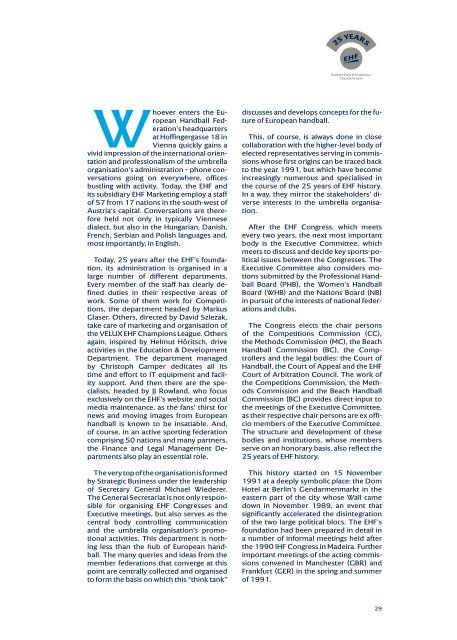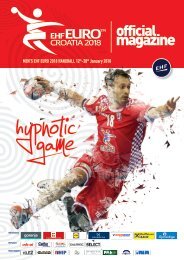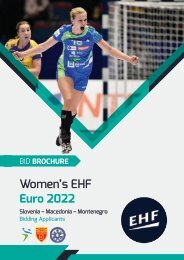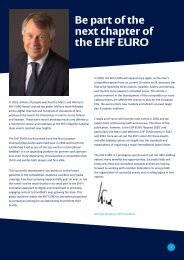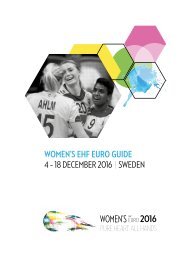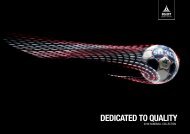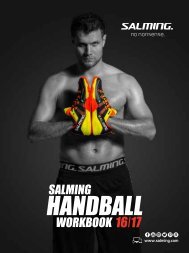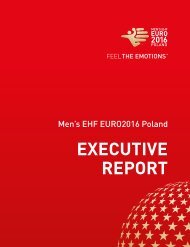ehf_25yers_book_webversion (1)
Create successful ePaper yourself
Turn your PDF publications into a flip-book with our unique Google optimized e-Paper software.
Whoever enters the European<br />
Handball Federation’s<br />
headquarters<br />
at Hoffingergasse 18 in<br />
Vienna quickly gains a<br />
vivid impression of the international orientation<br />
and professionalism of the umbrella<br />
organisation’s administration – phone conversations<br />
going on everywhere, offices<br />
bustling with activity. Today, the EHF and<br />
its subsidiary EHF Marketing employ a staff<br />
of 57 from 17 nations in the south-west of<br />
Austria‘s capital. Conversations are therefore<br />
held not only in typically Viennese<br />
dialect, but also in the Hungarian, Danish,<br />
French, Serbian and Polish languages and,<br />
most importantly, in English.<br />
Today, 25 years after the EHF’s foundation,<br />
its administration is organised in a<br />
large number of different departments.<br />
Every member of the staff has clearly defined<br />
duties in their respective areas of<br />
work. Some of them work for Competitions,<br />
the department headed by Markus<br />
Glaser. Others, directed by David Szlezak,<br />
take care of marketing and organisation of<br />
the VELUX EHF Champions League. Others<br />
again, inspired by Helmut Höritsch, drive<br />
activities in the Education & Development<br />
Department. The department managed<br />
by Christoph Gamper dedicates all its<br />
time and effort to IT equipment and facility<br />
support. And then there are the specialists,<br />
headed by JJ Rowland, who focus<br />
exclusively on the EHF’s website and social<br />
media maintenance, as the fans’ thirst for<br />
news and moving images from European<br />
handball is known to be insatiable. And,<br />
of course, in an active sporting federation<br />
comprising 50 nations and many partners,<br />
the Finance and Legal Management Departments<br />
also play an essential role.<br />
The very top of the organisation is formed<br />
by Strategic Business under the leadership<br />
of Secretary General Michael Wiederer.<br />
The General Secretariat is not only responsible<br />
for organising EHF Congresses and<br />
Executive meetings, but also serves as the<br />
central body controlling communication<br />
and the umbrella organisation’s promotional<br />
activities. This department is nothing<br />
less than the hub of European handball.<br />
The many queries and ideas from the<br />
member federations that converge at this<br />
point are centrally collected and organised<br />
to form the basis on which this “think tank”<br />
discusses and develops concepts for the future<br />
of European handball.<br />
This, of course, is always done in close<br />
collaboration with the higher-level body of<br />
elected representatives serving in commissions<br />
whose first origins can be traced back<br />
to the year 1991, but which have become<br />
increasingly numerous and specialised in<br />
the course of the 25 years of EHF history.<br />
In a way, they mirror the stakeholders’ diverse<br />
interests in the umbrella organisation.<br />
After the EHF Congress, which meets<br />
every two years, the next most important<br />
body is the Executive Committee, which<br />
meets to discuss and decide key sports-political<br />
issues between the Congresses. The<br />
Executive Committee also considers motions<br />
submitted by the Professional Handball<br />
Board (PHB), the Women’s Handball<br />
Board (WHB) and the Nations Board (NB)<br />
in pursuit of the interests of national federations<br />
and clubs.<br />
The Congress elects the chair persons<br />
of the Competitions Commission (CC),<br />
the Methods Commission (MC), the Beach<br />
Handball Commission (BC), the Comptrollers<br />
and the legal bodies: the Court of<br />
Handball, the Court of Appeal and the EHF<br />
Court of Arbitration Council. The work of<br />
the Competitions Commission, the Methods<br />
Commission and the Beach Handball<br />
Commission (BC) provides direct input to<br />
the meetings of the Executive Committee,<br />
as their respective chair persons are ex officio<br />
members of the Executive Committee.<br />
The structure and development of these<br />
bodies and institutions, whose members<br />
serve on an honorary basis, also reflect the<br />
25 years of EHF history.<br />
This history started on 15 November<br />
1991 at a deeply symbolic place: the Dom<br />
Hotel at Berlin’s Gendarmenmarkt in the<br />
eastern part of the city whose Wall came<br />
down in November 1989, an event that<br />
significantly accelerated the disintegration<br />
of the two large political blocs. The EHF’s<br />
foundation had been prepared in detail in<br />
a number of informal meetings held after<br />
the 1990 IHF Congress in Madeira. Further<br />
important meetings of the acting commissions<br />
convened in Manchester (GBR) and<br />
Frankfurt (GER) in the spring and summer<br />
of 1991.<br />
29


